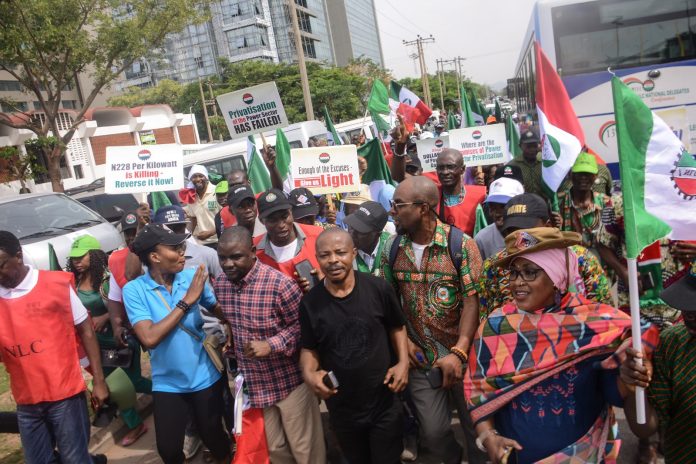

The Nigeria Labour Congress, on Tuesday, threatened to shut down the country for a month in protest against plans by the National Assembly to deregulate the national minimum wage.
NLC’s threat came as the nation awaits a new national minimum wage following months of negotiations between Organised Labour, the Federal Government, and the Organised Private Sector.
NLC President, Joe Ajaero, declared the position of the union while speaking on the sidelines of the 67th Nigeria Employers’ Consultative Association Annual General Meeting in Lagos.
Ajaero said, “As we are here, a Joint Committee of the Senate, the House of Representatives, and the Judiciary are meeting. They have decided to remove section 34 from the Exclusive legislative list to the concurrent list so that the state governors can determine what to pay you and so that there will be no minimum wage again. You cannot decide what you should earn.
“The very moment the House of Representatives and the Senate come up with such a law that will not benefit Nigerian workers, they will be their drivers and gatemen, and there will be no movement for one month. We cannot accept any situation where the governors and the National Assembly members will foist a slave wage on workers and force poverty on the citizens. Organised Labour will not accept it.”
The NLC president further stated that “We don’t have a situation where people determine their wages that amounts to some level of illegality. In the constitution, there is a provision for equal work for equal pay. If we go into job analysis and job evaluation, we may discover that a clerk here may be doing the same work as the clerk in Sokoto.
“The so-called decentralisation of wages to pay somebody here less than what the other person is receiving is against the concept of equity and equality before the law.”
According to the NLC president, the International Labour Organisation recognises wage as a national law, saying it is not for the sub-nationals.
The labour leader maintained that “every country has their minimum wage and some states are paying higher than the basic minimum wage, and that is the position of the law anywhere”.
However, he said, some people instigated by the governors were saying they would not be able to pay N60,000 even when their members were in the meeting with labour, saying this was being done in bad fate.
“We have put our members on notice that if these people succeed in coming up with such unpatriotic and obnoxious law. This democracy they are playing with, we have enough in this country in terms of hardship. Some people, based on their privileged positions want to inflict more Injuries on the workers and citizens of this country and that will not be accepted,” he stressed.
He added that the labour movement will not accept “slave wages”.
“Every worker in Nigeria across the country is seen as Nigerian workers and any attempt to discredit them in a federation will first be resisted by the NLC.
“There is no governor that is not receiving the same thing nationwide, they are not receiving according to their revenue in their states, but they want that of the workers to be so. So, the issue of using revenue as a basis for the payment of minimum wage is a lame one. If any governor is making that argument, then he doesn’t know what governance is all about,” he stated.
Such a governor, Ajaero emphasised, must use his capacity and acumen for the prosperity of the state.
“Governors can do better, and they should stop lamenting; because lamentation year in and year out that they can’t pay will not pay as far as there is a lot of money for them to control,” he cautioned.
Ajaero further argued that an average family of six live within N60,000 in a month and still go to work.
He submitted that NLC had proposed many options apart from the amount of the minimum wage, which if the government had addressed long before the removal of oil subsidies would have saved Nigeria from the current challenges.
Meanwhile, the Minority Leader of the House of Representatives, Mr. Kingsley Chinda, said there is a proposal before the National Assembly Committees on Constitutional Review to move the minimum wage from the exclusive list to the concurrent legislative list.
The minority leader’s clarification came against the backdrop of Ajaero’s position that the parliament had begun moves to decentralise minimum wage to enable states fix what is convenient for them to pay.
Speaking exclusively with The According in Abuja on Tuesday, Chinda stated that there were different opinions and views on whether minimum wage issues should be on concurrent or exclusive list, noting that “There is a proposal to move it to concurrent list where states could legislate on labour matters.”
While noting that federal laws prevail when they clash with state laws, the Peoples Democratic Party stalwart, however, advised that labour matters should remain on the exclusive list.
He continued, “On minimum wage, the Federal Government should consider a minimum living wage for all workers, both public and private. States or firms can go above the set wage, but not below.
“Labour disputes should be standardised and industrial courts should have precedents. The implication of making it a state responsibility is that states will set up their own industrial courts.”
He also added that a decentralised system “will weaken the labour movement and affect checks on the government. Governors are more likely to pocket the labour union in their states.”
According to him, international labour issues are treated on countries basis, stressing that “It will be complex if state labour groups become independent.”
Join Television Nigerian Whatsapp Now
Join Television Nigerian Facebook Now
Join Television Nigerian Twitter Now
Join Television Nigerian YouTUbe Now




![Tinubu Govt Announces Major Aviation Agency Reshuffle, Redeploys Key Figures [Full List]](https://tvn.ng/wp-content/uploads/2026/02/Bola-Ahmed-Tinubu-1-1200x720-1-218x150.jpg)
